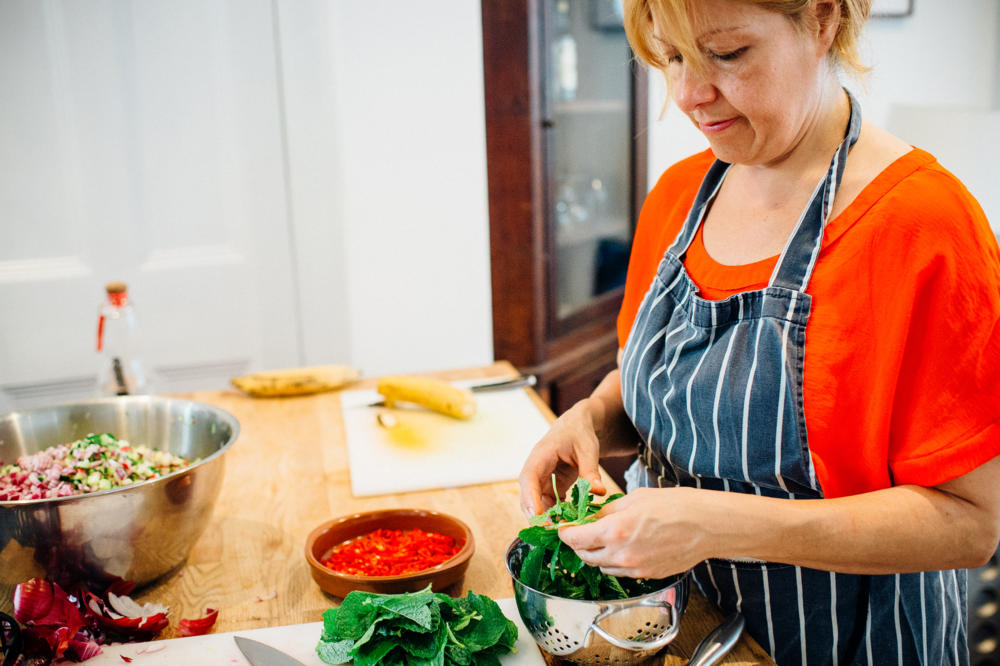Roberta Siao, a Brazilian immigrant in London, found that her dual status as a foreigner and mother made it impossible to find work. Yet at Mazi Mas, a London-based pop-up restaurant and catering service focused on training and employing immigrant and refugee women, she has found more than just a paying job. She tells her story in her own words.
Working at Mazí Mas is nothing like working in the restaurant industry. First of all, all of us are women and mothers. We are all from different countries and cultures. Yet the environment — even when we’re cooking — is more relaxed and peaceful. It might be busy but it’s never crazy. There’s not all that yelling. I think you can taste the difference in the flavors of the food. It’s almost like magic how everything comes together. We dance and chat and, at the end of the night, we cook and eat together like a family.
I’m originally from Rio in Brazil and came to London 12 years ago. I was just a young girl on holiday, then I met someone who became my husband and got pregnant almost straight away. At first I was happy being a mother and looking after our child, but eventually, I started thinking about what I wanted to do. I used to work at a bank but didn’t like it. So I tried to look for jobs but there were no jobs. Immigrants can work nights or get jobs in security or cleaning but these positions have no flexibility. As a mother, you have to be able to care for your children. Someone told me, “No one wants you. You have a child and you have no references. Give up.” I had past work experience and schooling and still faced so much discrimination. For other people, I imagine it’s impossible to find work.
I was in my 30s by then and it was scary. Maybe I didn’t have any worth in the workplace. I applied for a job at one of those big chain, fast-food cafes. They were about to hire me but asked if I had any children. Then they weren’t interested anymore. By law they’re not supposed to do that, but it would have cost me to try and sue.
When I finally found work at a proper restaurant, I had to give it up after three months. I was so unhappy. There’s so much sexism it’s unbelievable. They always gave me the assistant jobs and assumed I had to be in a smaller position. They didn’t know what I was capable of and never bothered to learn. One day I realized I didn’t have to keep working in these conditions, left, and was walking around smiling again. People think restaurants have to be this way but they don’t.
I decided to volunteer as a chef, and that’s where I met the founder of Mazí Mas. The pay is above London fair wage, which is much better than most places. But it’s more than just money. Coming here allows women to feel confidant and respected, to have a life outside of the home. Even the menu is an expression of each of the chef’s cultures. I do feijoada, which is a Brazilian pork stew with beans. These aren’t dishes you’d cook every night. They’re the ones people have for special events.
We learn different food from each other. Now I cook Turkish and Lebanese and Iranian food. I’d never used saffron in my life, and Iranian food is all about saffron. Their culture has thousands of years of tradition which is reflected in the food. It’s aromatic and beautiful and sophisticated. Another cook who had never used coconut milk has learned how to use it for the dishes from my country. It’s an important skill that we can take with us and gives us a better understanding of food and ingredients. Not many people get the opportunity to learn dishes from so many countries.
And it’s important to note that this isn’t a charity. When we cook for people, it’s because what we make is delicious. We finally can show people that we do have value in the workplace, that a business run by women from many different countries can be taken seriously. Young girls can get jobs because they have no families or responsibilities at home. Men can get jobs because they have the flexibility of getting rid of the children, working nights or other odd times. Not having a child makes all the difference.
It’s so sad to see what I call the “invisible army of women” in their 30s and 40s who walk around with nothing but their children. They work constantly, yet it’s all for free. They have lots to offer and could have training. I think women contribute so much and get so little in return. We don’t have to accept this anymore.
As told to Tove Danovich
9(MDA3MTA1NDEyMDEyOTkyNTU3NzQ2ZGYwZg004))
